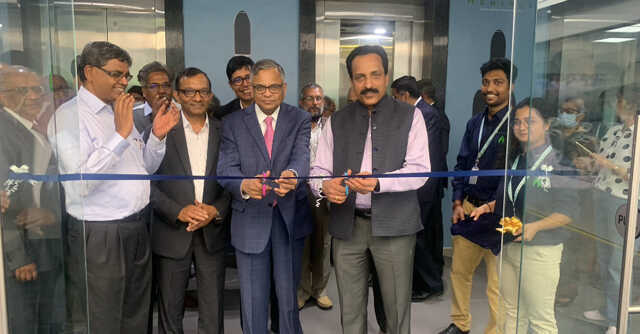
Agnikul Cosmos opens India’s first private rocket engine factory in Chennai


Homegrown space startup, Agnikul Cosmos, the country’s first private factory dedicated to building rocket engines in Chennai on Wednesday, inaugurated by inaugurated by N Chandrasekaran, chairman, Tata Sons, and S Somanath, chairman of ISRO and secretary, department of space. The company said that the facility will use additive manufacturing technology to build 3D printed rocket engines, and will be used to produce engines for its own in-house rockets.
Srinath Ravichandran, chief executive of Agnikul Cosmos, said that the facility presently has the capacity to build two rocket engines from scratch, every week. This will allow the factory to produce eight engines every month, and build the number of engines required to launch Agnibaan – its two-stage launch vehicle, expected to launch by the end of the year.
“Since companies and organisations looking to launch satellites no longer have access to Russian facilities, and launching aboard heavy rockets could be expensive, small orbital launch vehicles can help India win a large chunk of satellite launch orders in the near future,” Ravichandran said. He added that the company will take an additional week to launch the rocket, once the engines are ready.

The company said that it already has partners who are preparing small-sized satellites to be launched on the Agnibaan rockets, and the factory will address this demand. Agnibaan is an ultra-light launch vehicle that is lighter than the Indian Space Research Organisation (ISRO)’s upcoming small, light commercial rocket – the Small Satellite Launch Vehicle (SSLV). While the SSLV can carry payloads of around 300kg, Agnibaan will be able to carry payloads of up to 100kg to low Earth orbits (LEOs) of up to 700km above Earth.
To be sure, Agnikul Cosmos is not the only entity that is building such small launch vehicles for use in commercial space missions. Fellow Indian space startup Skyroot Aerospace is also nearing a technology demonstration (or test) launch of its own indigenous rocket, Vikram, later this year.
“Gaining the ability to build small, easy to build and affordable rockets on a conveyor belt setup will help India build capacity to attract a larger chunk of the global satellite launches market,” said Chaitanya Girl, a consultant at Ministry of External Affairs-affiliated Research and Information System for Developing Countries.

With satellite internet operators, and space sensing and earth observation technology startups looking to deploy small satellite constellations in low Earth orbits, light and affordable rockets, and even ISRO’s Polar Satellite Launch Vehicles (PSLVs), which are being developed by an industry consortium comprising Hindustan Aeronautics Limited and Larsen & Toubro, could all contribute to India offering multiple avenues for educational institutes, research organisations and private companies launch their satellites in orbit.
Speaking at the inauguration of industry body Indian Space Association (ISpA)’s headquarters in New Delhi, Pawan Goenka, chairman of nodal government agency for space, Indian National Space Promotion and Authorisation Center (IN-SPACe), said that the scope for growth in the commercial market could grow for private Indian space startups – once they prove their technologies and conduct initial launches.
